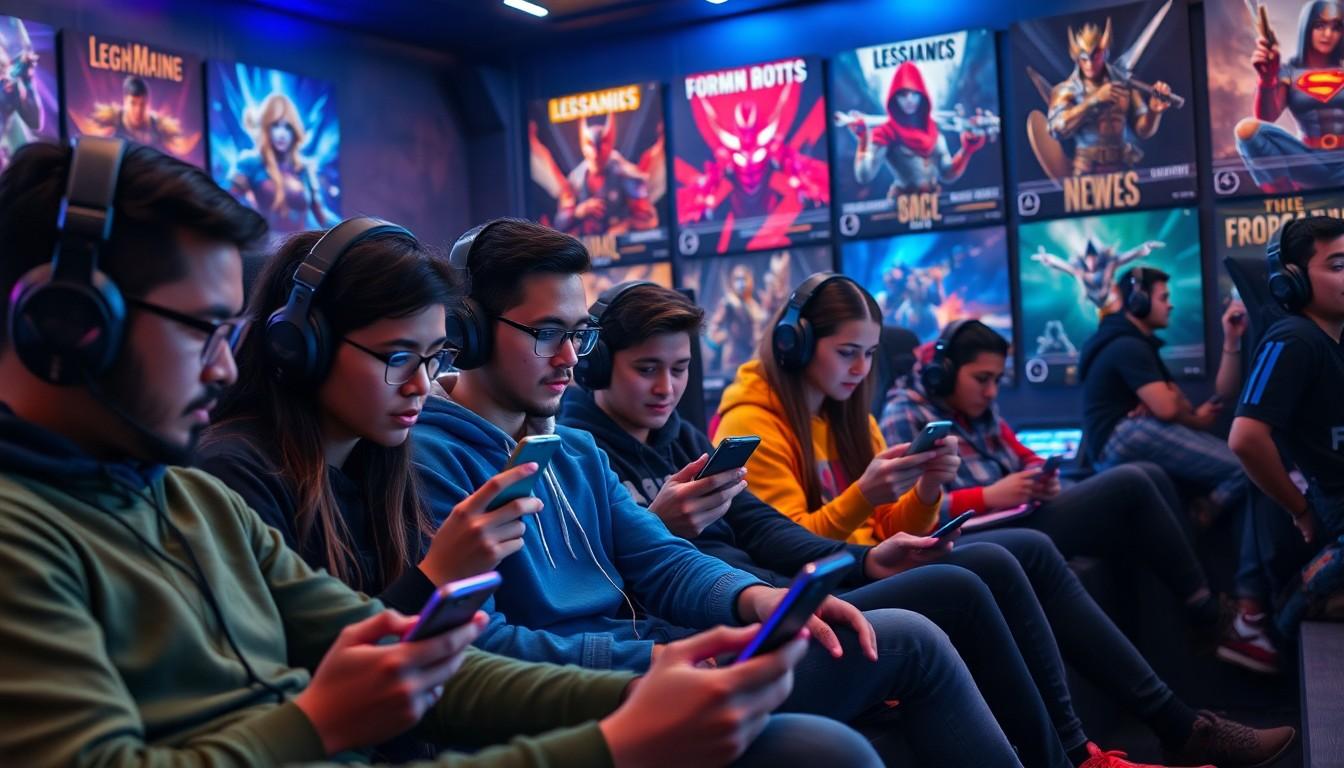In a world where everyone’s glued to their screens, competitive mobile games have taken the spotlight. They’re not just a way to pass the time; they’re a battleground where strategy meets skill, and every tap could lead to glory or defeat. Whether you’re a casual player or a seasoned pro, these games offer adrenaline-pumping action that keeps players coming back for more.
Imagine battling it out with friends or strangers from across the globe, all while trying to maintain your cool. It’s like a digital gladiator arena, but with fewer swords and more swipes. With a plethora of options available, finding the right game can feel like searching for a needle in a haystack. But fear not! This guide will help navigate the thrilling world of competitive mobile gaming, ensuring you’re always one step ahead of the competition.
Competitive Mobile Games
Competitive mobile games provide players with intense arenas for strategy and skill. They engage participants in various game genres, ranging from battle royales to multiplayer online battle arenas (MOBAs). Players connect and compete in real-time, which enhances the thrill of each match.
Statistics reveal significant growth in this sector. In 2023, the mobile gaming market reached a revenue of approximately $93.2 billion, with competitive games capturing a large share. Popular titles like PUBG Mobile and League of Legends: Wild Rift dominate the scene, attracting millions of players worldwide.
Players enjoy a range of gaming experiences. Skill-based matchmaking systems create balanced environments where talent can shine. Leaderboards and tournaments elevate the competitive aspect, showcasing top performers and fostering a sense of community.
Frequent updates and seasonal events keep the gameplay fresh. Developers introduce new characters, maps, and game modes, ensuring sustained interest among players. This dynamic nature contributes to a vibrant ecosystem of competitive mobile gaming.
E-sports has become a significant part of the mobile gaming landscape. Major tournaments offer substantial prize pools, providing motivation for players to improve. Brands engage in sponsorships, further blurring the lines between casual gaming and professional competition.
A well-designed user interface enhances the competitive experience. Smooth controls and responsive gameplay are critical for maintaining an edge during competitions. These elements can determine victory or defeat, highlighting the importance of quality in mobile game development.
Popular Genres in Competitive Mobile Games

Competitive mobile games encompass various genres, each offering unique gameplay experiences and attracting diverse players. Understanding these genres helps in choosing the right game for competitive play.
Battle Royale Games
Battle royale games engage players in large-scale multiplayer matches where survival is paramount. Titles like PUBG Mobile and Fortnite dominate the genre, often featuring up to 100 players competing against one another. Players drop onto a shrinking battlefield, scavenging weapons and resources while outlasting opponents. Strategy plays a crucial role, as positioning and decision-making affect outcomes. Frequent updates keep the gameplay fresh, introducing new maps and game mechanics that enhance player experience.
MOBA Games
Multiplayer Online Battle Arena (MOBA) games offer team-based strategic gameplay. Popular titles such as League of Legends: Wild Rift and Mobile Legends: Bang Bang attract millions of players worldwide. Each match involves two teams, typically composed of five players, who battle to destroy the enemy’s base. Characters possess unique skills, requiring players to master their roles while coordinating efforts with teammates. Clear communication and teamwork are essential for success, making MOBA games a hub for competitive strategy.
Card Games
Competitive card games provide strategic depth through deck building and tactical play. Titles like Hearthstone and Gwent emphasize decision-making with each card drawn. Players confront one another by creating powerful combinations, often resulting in dramatic battles. The genre thrives on frequent updates that introduce new cards, adjustments to existing ones, and seasonal events that refresh gameplay. Competitive card games appeal to strategic thinkers, as they require analyzing opponents’ moves and countering effectively.
Key Features that Enhance Competition
Competitive mobile games offer dynamic features that elevate the gaming experience and intensify rivalry among players. Elements like skill-based mechanics and in-game rankings play crucial roles in shaping competitive landscapes.
Skill-Based Mechanics
Skill-based mechanics form the backbone of competitive mobile games. Players develop their abilities through practice and strategy, which directly influences match outcomes. Precision controls, complex gameplay systems, and well-timed reactions determine success. Notable titles integrate diverse skill sets, allowing players to master specific characters or roles within the game. Each match requires quick decision-making, fostering an environment where practice leads to improvement. Games like League of Legends: Wild Rift exemplify this approach, encouraging players to refine their tactics and adapt to opponents’ strategies.
In-Game Rankings and Leaderboards
In-game rankings and leaderboards motivate players to achieve excellence. Rankings provide measurable goals, showcasing player progress and performance. Leaderboards highlight top competitors, creating a sense of urgency to climb higher. Games implement tiered systems, allowing players to compete against others of similar skill levels. This creates fair and intense matchups. Seasonal resets refresh these rankings, ensuring continuous engagement. Popular games like PUBG Mobile incorporate these elements to foster a competitive community, encouraging players to strive for higher placements and recognition.
The Role of Community and Esports
Competitive mobile games thrive on vibrant communities and the energizing atmosphere of esports. These elements enhance player engagement and create an immersive gaming experience.
Online Tournaments and Events
Online tournaments and events have become essential for competitive mobile gaming. They foster a sense of camaraderie among players as they compete for rankings. High-stakes competitions, such as PUBG Mobile’s Global Championship, draw thousands of participants and millions of viewers. Events like these often boast impressive prize pools, attracting both amateur and professional players. Furthermore, tournaments encourage player development by highlighting skill and strategy, as seen in League of Legends: Wild Rift tournaments. These competitive environments not only showcase talent but also elevate games to an esports level, fundamentally reshaping how players interact and engage.
Community Engagement and Support
Community engagement plays a vital role in competitive mobile gaming. Player forums and social media platforms provide spaces for discussion and strategy sharing. Many games include official channels where developers gather player feedback, strengthening the connection between brands and gamers. Local events and community tournaments often bolster participation by allowing players to showcase their skills in friendly competitions. Popular titles frequently see players form teams, encouraging collaboration and fostering friendships, as evident in games like Clash Royale. This level of engagement creates loyal player bases, enhancing the overall competitive landscape and sustaining interest in mobile gaming as a whole.
Future Trends in Competitive Mobile Gaming
Emerging technologies are shaping the future of competitive mobile gaming. Augmented reality (AR) and virtual reality (VR) integration allows for immersive gameplay experiences, bringing players closer to their digital environments. Upcoming titles are expected to incorporate these technologies, enhancing realism and engagement.
Increased focus on cross-platform play broadens the competitive landscape. Players on mobile devices will compete against those on consoles and PCs, creating a unified player base. This shift will not only enhance accessibility but also elevate the overall level of competition.
AI-driven matchmaking systems are predicted to personalize competitive experiences. These systems will analyze player behaviors and skill levels, ensuring balanced matchups. As a result, players can expect fairer gameplay and improved skill development opportunities.
The rise of 5G technology is set to revolutionize gameplay experiences. Fast internet speeds will minimize latency and enhance connectivity, allowing for smoother gameplay. Competitive mobile games will benefit from reduced delays, contributing to more intense matches.
Esports in mobile gaming will continue expanding, with larger prize pools and sponsorships. Major tournaments are anticipated to attract even more spectators, providing opportunities for players to showcase their talents on a global stage. Increased visibility will further legitimize competitive mobile gaming within the broader esports ecosystem.
Developers are likely to prioritize community engagement. Live-streaming events, interactive features, and regular updates will foster connections between players and developers. Through these avenues, gamers can share feedback and influence game development, enhancing the community experience.
The future of competitive mobile gaming promises innovation and growth, catering to a diverse audience. As technology evolves, new gaming experiences will emerge, pushing the boundaries of competition and strategy. Players can expect exciting advancements and enhanced engagement in the years ahead.
More Than Just a Trend
Competitive mobile gaming is more than just a trend; it’s a thriving ecosystem that continues to evolve. As players embrace the challenge of competing against others, the landscape is set for exciting developments. The fusion of technology and gameplay innovation promises to enhance the overall experience.
With the rise of esports and community-driven events, players will find more opportunities to showcase their skills and connect with others. The future holds great potential for immersive experiences and cross-platform play, making competitive gaming accessible to a broader audience.
As this dynamic arena grows, players can look forward to thrilling matches and a vibrant community that fuels their passion for competition.




